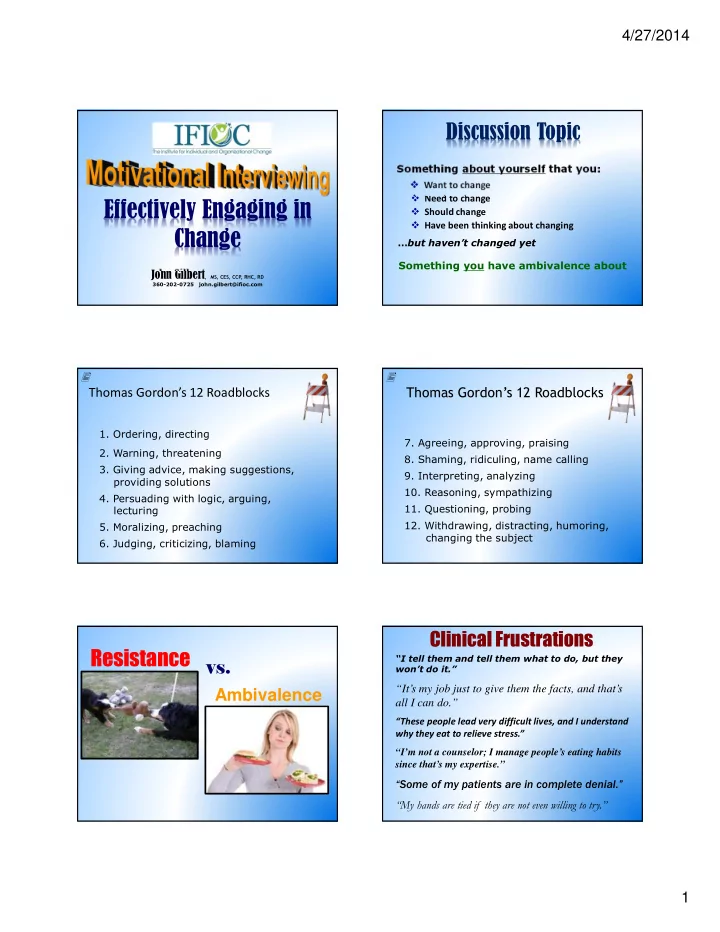

4/27/2014 Discussion Topic Something about yourself that you: � Want to change � Need to change Effectively Engaging in � Should change � Have been thinking about changing Change … but haven’t changed yet Something you have ambivalence about John Gilbert , MS, CES, CCP, RHC, RD 360-202-0725 john.gilbert@ifioc.com � � Thomas Gordon’s 12 Roadblocks Thomas Gordon’s 12 Roadblocks 1. Ordering, directing 7. Agreeing, approving, praising 2. Warning, threatening 8. Shaming, ridiculing, name calling 3. Giving advice, making suggestions, 9. Interpreting, analyzing providing solutions 10. Reasoning, sympathizing 4. Persuading with logic, arguing, 11. Questioning, probing lecturing 12. Withdrawing, distracting, humoring, 5. Moralizing, preaching changing the subject 6. Judging, criticizing, blaming Clinical Frustrations Resistance vs. “I tell them and tell them what to do, but they won’t do it.” Ambivalence “It’s my job just to give them the facts, and that’s all I can do.” “These people lead very difficult lives, and I understand why they eat to relieve stress.” “I’m not a counselor; I manage people’s eating habits since that’s my expertise.” “Some of my patients are in complete denial.” “My hands are tied if they are not even willing to try.” 1
4/27/2014 Paradigm Shift Resistance vs. INTO Curious Facilitator of OUT OF Telling Pt saying “I should…” “YOU should…” Ambivalence • You’re still an expert in • You’re expert health… AND Collaboration • You educate • Pt is expert in what they will • Lots of advice actually do • You write Plan • FACILITATOR: You guide conversation so Pt argues for change • Edu / Menu of options when asked for… • Pt writes plan based on importance / confidence WARNING!!! SELF-DETERMINATION THEORY Mismatching your intervention to the client’s stage of change fosters resistance When you get attached to an outcome OR YOU push a quicker pace, you facilitate “resistance” VS. Why Use MI? Why Use MI? � Over 300 clinical trials demonstrate its efficacy Healthcare Research (www.motivationalinterview.net) � “Motivational Interviewing (MI) is the only health Eight studies were identified in the coaching approach to be fully described and consistently demonstrated as causally and fields of diabetes, asthma, independently associated with positive behavioral hypertension, hyperlipidemia, and outcomes (Butterworth, Linden, McClay 2008) heart disease. The majority of studies � It’s significantly more efficient than other found positive results for effects of MI approaches (Lundahl et al. 2010) on psychological, physiological, and � Standardized method of delivery, training and life-style change outcomes. coding tools exist to assess fidelity Not a script, more so a skill set A systematic review of motivational interviewing in physical health care settings E.g. learning a new language, a new instrument, etc… K. M. Knight, L. McGowan, C. Dickens, C. Bundy 2010 2
4/27/2014 Motivational Interviewing Why Use MI? FIDELITY � “Healthcare providers who know how to effectively deal with patients’ resistance and ambivalence have adherence rates five times higher than information giving.” � #1 predictor of Rx adherence & outcomes is pt perception on provider “empathy”. � Motivation is not enhanced by persuasion or convincing…it’s internal � Motivation is increased when pt understands & WANTS TO change symptoms or consequences � Pt MUST be involved in setting goals, if it doesn’t match to something important to their life, they won’t do it Bruce Berger, PhD, R.Ph Head and Professor of Pharmacy Care Systems, Auburn University Evaluations � Compassionate Helper Motivational Interview � Successful Evidence-based Practitioner If the Only Tool You Use is a Hammer then Everything Looks Like a Nail. Motivational Interviewing Motivational Interviewing is NOT… …is goal-oriented • Just a client-centered approach Person-centered, Directional • What professionals already do naturally method of communication for enhancing intrinsic motivation by • A technique or gimmick exploring and resolving • Manipulative (whose agenda) ambivalence about change • A solution to all problems (panacea) 3
4/27/2014 Motivational Interviewing Motivational Interviewing • Goal-oriented communication Primary Goals of MI: • Person-centered collaboration � Reduce/Minimize resistance • Harnesses intrinsic motivation � Explore discrepancy between behavior and values/goals… resolve ambivalence • Explores and resolves ambivalence � Elicit “change talk” and move into behavior about specific target behavior change • Linguistic focus on change language How is Motivational Interviewing an EBP? WARNING!!! MI = Mismatching your intervention to the How do I know when to use MI as my primary client’s stage of change fosters resistance approach? � Resistance When you get � Low motivation attached to an outcome � Hesitancy to engage in services OR � Difficulty changing a desired behavior YOU push a quicker pace, When would I be less likely to use MI as my you facilitate “resistance” primary approach? When a client is motivated and already working on making positive changes Empathy How he/she feels 4
4/27/2014 People often say motivation doesn’t last. Well neither John Gilbert does bathing. That’s why we 360-202-0725 john.gilbert@ifioc.com recommend it daily. www.ifioc.com Zig Zigler Motivational Interviewing Motivational Interviewing ifioc.com Motivational Motivational Motivational Interviewing in the Interviewing in Resources Health Care Interviewing, Third Treatment of Health Care: Helping Edition: Helping Psychological Patients Change People for Change Section Problems Behavior by William by William Miller & Stephen by William Miller, Stephen Rollnick Miller, Stephen Rollnick, & Rollnick, Hal Arkowitz, & Christopher Butler Henny Westra Motivational Interviewing How To Do Motivational Building Motivational www.samhsa.go Interviewing Skills Interviewing: A Guidebook v by David Rosengren for Beginners by Bill Matulich TIP 35 5
Recommend
More recommend